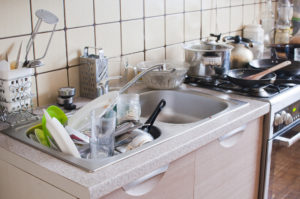When you live with your parents, you probably aren’t taking total responsibility for household chores. Your parents may take care of the laundry, cooking, dishes, and general household maintenance. When you move out though, you’re going to need to be able to hold your own. While this is especially pertinent to students who are moving into off-campus housing and will be maintaining their own living spaces and cooking for themselves, students who live in dorms and buy into a meal plan still need to be able to do their own laundry, iron a shirt for an interview, and keep their rooms tidy.
Skills You Need around the House:

Africa Studio / Shutterstock.com
- Learn how to clean. Yes, you may have been cleaning your bedroom once a week up to this point, but now you could be responsible for a whole apartment and/or your own bathroom. Toilets can get downright nasty really quickly, so grab your sponge and your Clorox and dive right in. Plus, no one wants to wash their hands in a sink that has toothpaste all over it. Don’t forget, shower curtain liners need to be washed about once a month to prevent bacteria and mold growth. That’s just the bathroom, though; other rooms will need to be dusted, swept, vacuumed, and generally tidied. If you live with roommates, make a chore calendar so that you’re not stuck doing all the dishes AND the bathrooms yourself. Your parents will be so proud when they come for a visit.
- Figure out how to use a plunger. You know why.
- Buy or make a sewing kit and learn how to repair a button. Buttons pop off all the time, and they’re really easy to fix, provided you have a needle and thread. Instead of taking your damaged shirts to a tailor (who will charge you) or home to your mother (she will not be pleased), spend five minutes on a little DIY magic and your shirts will be good as new. Plus, now you know why shirts and jackets come with extra buttons in an envelope when you buy them.
- Learn how to deal with vermin. You may find that all sorts of creatures want to make themselves at home in your apartment, from mice to roaches, ants, and wasps. Each type needs to be dealt with a little bit differently, so do your research before you buy poison or traps.
- Keep track of when your furnace filter needs replacing, keep extra batteries in the apartment for your smoke detectors, and keep a stock of lightbulbs. Furnace filters exist to keep your HVAC system clean. Depending on where you live, you may not have to deal with this, but if you do, replacing your furnace filter on a regular basis is essential to maintaining good airflow throughout your apartment, making sure the HVAC system runs efficiently, and keeping pollutants out of the air (particularly important for allergy sufferers). As for the batteries and lightbulbs, you’ll know when you need them, and trust me, you don’t want to have to listen to the high-pitched beeping of a smoke detector for as long as it takes you to get to the store for a new battery.
- Know who to call in an emergency. If there’s a fire, a crime, or a medical emergency, you should know to call 9-1-1. But who do you call when the electricity goes out? What happens if you smell gas? What if your air conditioning stops working? Who has an extra key if you lock yourself out or need someone to walk the dog because you won’t be home in time?
Skills You Need to Keep the House:
- Learn how to keep a budget. Your rent is going to cost the same every month, as might your internet bill, but your water, gas, and electric bills may change. If you budget for the maximum that these might cost each month, you’ll know how much you have leftover to save or spend. Don’t forget to include groceries and commuter costs when developing your budget. These apps will help keep you on track. If cable television doesn’t fit into your budget, consider paying for a Netflix or Hulu subscription instead, or go without.
- Keep track of when your bills are due. You don’t want to be caught without power because you forgot to pay your electric bill. Bills are typically sent once a month; you’ll get either an email or a letter, depending on whether you signed up for “green” billing. The easiest option is just to write a check or pay your bill online as soon as you get it. If you get into that habit, you won’t have to worry about deadlines or whether or not you remembered to pay.
Skills You Need for Grocery Shopping and Cooking for Yourself:

antos777 / Shutterstock.com
- Know how to do the dishes and keep a clean kitchen. No one wants to eat a meal that’s been cooked in a dirty pan or served on plates that are still crusted with last night’s dinner. Doing dishes is as simple as owning a sponge and dish soap, or rinsing things off before loading the dishwasher. As for the rest of the kitchen, use a disinfectant on any countertops that have come into contact with raw meat or fish; throw away anything in your fridge that is a) obviously molding or smells bad, b) past its expiration date, or c) more than about a week past its sell-by date; and take out the trash before it begins overflowing or starts to smell.
- Before you leave home for the first time, learn how to make a few simple meals. I’m not talking about Top Ramen or Easy Mac, though both are deliciously salty. I’m talking real food that you cook on the stove and that vaguely resembles something healthy. Of course, I’d be lying if I said that I didn’t eat an obnoxious amount of (microwaved) cheese grits when I was a senior, but you should aspire to do better. This list of 52 healthy meals should help you get started.
- Especially important for students who live off campus is learning how to grocery shop. The first rule of grocery shopping: don’t go when you’re hungry. The second rule: don’t go without a list. Take some time once a week to plan out all of the meals that you’re going to make that week and write down what ingredients you need. Once you’re at the store, stick to the list. Yes, Oreos might be calling your name, but there’s no need to head down that aisle unless something on your list requires it. Stay strong!
- Become a master coupon cutter. Depending on where you live, you may get coupons in the mail. My parents used to get them in the Sunday paper, but now I get them in the mail once a week and I don’t subscribe to anything. Even if you don’t have physical coupons to clip, you can get discounts by signing up for the ibotta app. As they say, a penny saved is a penny earned.
Skills You Need to Work on at Home to Succeed in School:
- Know when to go to bed early. Yes, parties are fun, and everyone will agree that trivia night at the local bar is amazing. But when you have class at 8:30 a.m. the next day, you’re not going to feel great about staying up with your friends, especially if you didn’t finish all your homework. The easiest rule is this: weeknights are for school, weekends are for you. The night before a test, even though there’s a huge party? Definitely for school.
- Become decent at waking up. The screech of an alarm clock is deafening in the morning and it’s so easy just to hit the snooze button and head back into your dreams, but when you have class and a commute to campus, you don’t have the luxury of sleeping in. You’ll get even better at waking up during the week if you get up at approximately the same time every day, including weekends.

Andrey_Popov / Shutterstock.com
You’re not going to succeed at everything every day. I’d be lying if I said I washed my shower curtain liners as often as I should or if I suggested that I’ve mastered the art of waking up without the snooze button. It’s okay not to be perfect, but these skills will make your everyday life away from home significantly easier the sooner you learn them!
-
Executive Functioning Skills: Planning, Prioritizing, and Task Initiation
-
Creative Ways to Save Money Even When You Feel Broke
-
Easy Ways to Save Money and Lengthen the Life of Your Car
-
Executive Functioning Skills: Organization and Time Management
-
How to Prepare for a Safe Road-Trip
-
Life Skills that Will Help You Both at School and in Your Career
-
Goal Setting: Why It’s Important and How to Succeed
-
The Relationship between Credit Card Debt and Credit Card Literacy
-
Dealing with Bedbugs in College
-
What You Need to Know about Buying Your First Car
-
Executive Functioning Skills: Attention and Working Memory
-
Packing for a Cold Climate: What to Wear and Where to Shop


